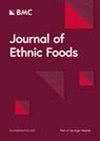安纳托利亚地理遗产:已登记的祖先小麦品种(siyez、gacer和menmenki)
Q1 Social Sciences
引用次数: 0
摘要
土耳其是世界上主要的小麦种植区之一,在这里小麦具有经济、社会、文化和考古价值。安纳托利亚地区是小麦的故乡,也是小麦祖先品种的基因中心。祖传的小麦没有经过任何基因改造而存活下来,是一种生物和文化遗产。祖传小麦品种丰富的营养价值、独特的风味和香气使它们比现代同类品种更有价值。然而,优先生产现代小麦品种导致了祖先品种的遗忘和产量的下降。这项研究旨在提高人们对已登记的祖先小麦品种(即siyez, gacer和menencki)的认识,这些品种是安纳托利亚的文化遗产,已被遗忘。为此,它处理了祖先小麦品种的一般特征,土耳其烹饪中不可或缺的一部分,它们的营养价值,以及它们在当地烹饪中的应用。在当地烹饪文化中增加对这些已登记的祖先小麦品种的使用,并确保当地价值的可持续性,增加了本研究的意义。本文章由计算机程序翻译,如有差异,请以英文原文为准。
Heritage of the Anatolian geography: registered varieties of ancestral wheat (siyez, gacer, and menceki)
Abstract Turkey is one of the major regions of wheat cultivation where wheat has economic, social, cultural, and archaeological values. The Anatolian lands are the homeland of wheat and the gene center of ancestral wheat varieties. Having survived without any genetic modification, ancestral wheat is a biological and cultural heritage. The rich nutritional value, unique flavor, and aroma of ancestral wheat varieties make them more valuable than their modern equivalents. However, prioritizing the production of modern wheat varieties has prompted the oblivion of ancestral ones and a decline in their production. This study aimed to raise awareness about the registered ancestral wheat varieties (i.e., siyez, gacer, and menceki), the cultural heritage of Anatolia, which has sunk into oblivion. To this end, it tackled the general characteristics of ancestral wheat varieties, an indispensable part of the Turkish cuisine, their nutritional value, and their use in local cuisines. Increasing the use of these registered ancestral wheat varieties in local culinary cultures and ensuring the sustainability of local values increases the significance of this study.
求助全文
通过发布文献求助,成功后即可免费获取论文全文。
去求助
来源期刊

Journal of Ethnic Foods
Social Sciences-Anthropology
CiteScore
4.00
自引率
0.00%
发文量
43
审稿时长
16 weeks
期刊介绍:
The Journal of Ethnic Foods provides comprehensive coverage about people’s consumption of food and aims to illuminate the benefits of traditional understanding and knowledge of foods developed over a long time. Food and eating are studied by several disciplines because food has always been more than just nutrients. Food studies have provided better insights into important societal processes involving economics, health, politics, history, and the environment. The journal emphasises research that explores food, gastronomy and eating behaviours that are related to particular geographical contexts and ethnicities. The uniqueness, variety and creativity of food traditions and cultures, as well as the complex interplay of societal and environmental factors can be fully understood by considering perspectives on ethnography, cultural anthropology, population health and well-being, biology, history, ecology and geography. Articles in scope with the journal should cover these areas. The journal welcomes review articles in all those fields, especially those highlighting the multidisciplinary nature of the study of ethnic food.
 求助内容:
求助内容: 应助结果提醒方式:
应助结果提醒方式:


